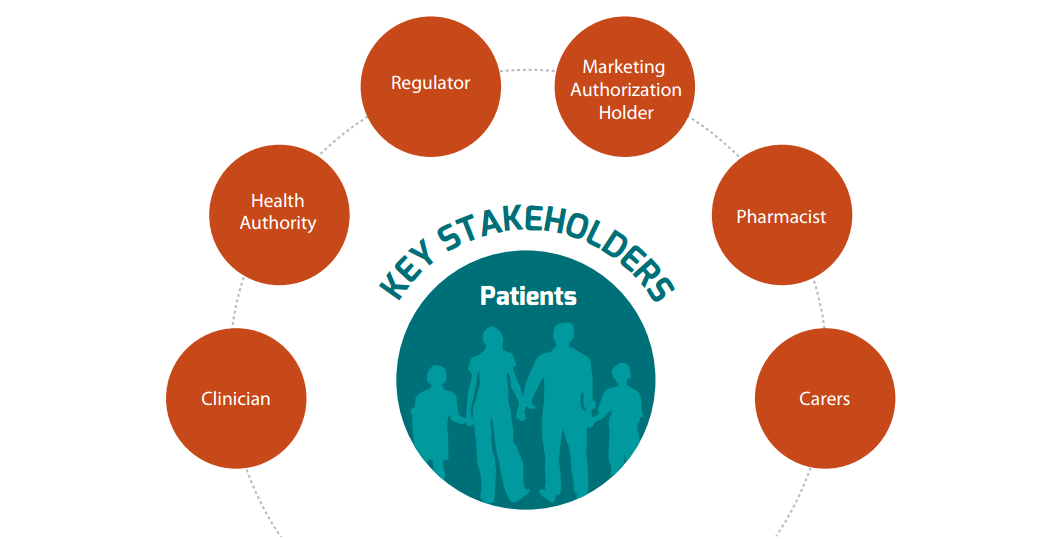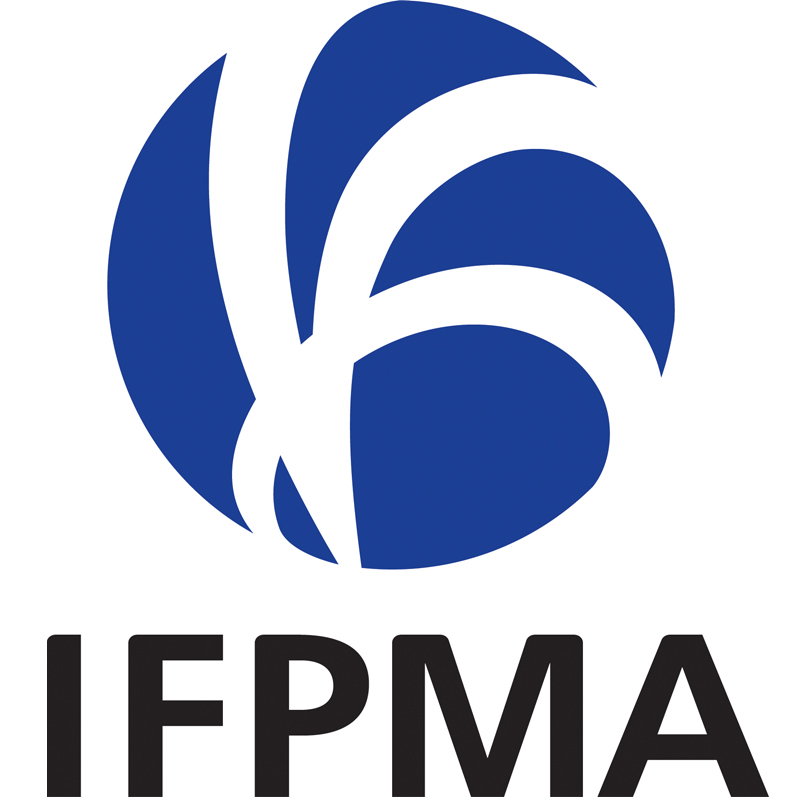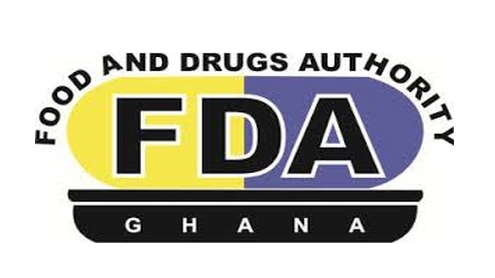9:00 - 9:10
Welcome by Mr. Hudu Mogtari,
CEO, Ghana Food & Drugs Authority
9:10 - 9:15
Introduction to the workshop by Janis Bernat,
Associate Director, Biotherapeutics & Scientific Affairs at IFPMA
9:15 - 10:30
Pharmacovigilance in the Pre-approval Setting (Chair: Alex Dodoo, WHO CC; Co-Chair: Nevena Miletic, IFPMA)
Session 1:
Elements of a Risk Management Plan (RMP)
1. Alex Dodoo, Director, WHO Collaborating Centre for Advocacy and Training in Pharmacovigilance
10:30 - 10:45
Coffee Break
10:45 - 12:00
RMP Issues & Challenges: NRA & Industry Perspectives
Session 2 (30 min presentation & 15 min Q&A):
1. Helga Nosiri, Assistant Director, Pharmacovigilance/Post Marketing Surveillance (PV/PMS) Directorate, National Agency For Food and Drug Administration and Control (NAFDAC)
2. IFPMA – Nevena Miletic, Regulatory Policy Lead (Roche)
12:00 - 13:00
Lunch
13:00 - 14:45
Pharmacovigilance in the Post-approval Setting Chair: Delese Darko, Ghana FDA Co-Chair: Karin Heidenreich, IFPMA
Session 3:
Regulatory Assessment & “Noncomparable Biotherapeutics”: Regional/National Regulatory Authority & Industry Perspectives
1. Sybil Nana Ama Ossei-Agyeman-Yeboah, Professional Officer in Charge, Essential Medicines and Vaccines, West African Health Organisation
2. Delese Darko, AG. Deputy Chief Executive, Safety Monitoring & Clinical Trials Division Ghana Food & Drugs Authority
3. IFPMA – Karin Heidenreich, Public Policy R&D (Novartis)
14:45 - 15:00
Coffee Break
15:00 - 15:45
Interactive Panel Discussion
Moderator: Lorenz Scheppler (Janssen, IFPMA)
Session 4: Panel Discussion and Q&A
Participants: Chairs, Co-Chairs & Speakers
15:45 - 16:00
Wrap-up & closing of the workshop, summary of main outcomes.
Session Chairs: Alexander Dodoo & Delese Darko

Hudu Mogtari
Chief Executive Officer (CEO), Food and Drugs Authority (FDA) of Ghana
Hudu is the Chief Executive Officer (CEO) of the Food and Drugs Authority (FDA) of Ghana. He holds an Executive Master of Business Administration (MBA) degree from the Ghana Institute of Management and Public Administration (GIMPA) and a Bachelor of Science in Pharmacy (BSc Pharm) from the University of Hacettepe in Ankara, Turkey. He was awarded a Certificate in Strategic Management in Regulatory and Enforcement Agencies (SMREA) at the Harvard Kennedy School of Government. He also has training in Clinical Investigation by the Centre for Drug Evaluation and Research (CDER) of the United States Food and Drugs Administration (USFDA), advanced training in Diabetes and Endocrinology at the Centre for Diabetes and Endocrinology in South Africa as well as training at the United States Pharmacopoeia (USP) in USA. Mr. Hudu has over 20 years’ experience as a pharmacist and he was the country manager for Eli Lilly prior to his appointment as the Chief Executive of the FDA. Under his leadership the FDA has achieved ISO 17025 accreditation for its Drugs Physico-Chemical Laboratory. The FDA has also been designated as a Regional Centre of Regulatory Excellence (RCORE) in the area of Medicines Evaluation and Registration as well as Clinical Trials Oversight.

Alexander Dodoo
Director, WHO Collaborating Centre for Advocacy and Training at the University of Ghana
Alexander Dodoo (PhD, FPSGH, FPCPharm, FGCPharm) is an Associate Professor at the Centre for Tropical Clinical Pharmacology, School of Medicine and Dentistry, University of Ghana as well as the Director of the WHO Collaborating Centre for Advocacy and Training at the University of Ghana. He serves on several local and international advisory, training and safety committees, including Member, WHO Advisory Committee on the Safety of Medicinal Products; Member, Access & Product Management Advisory Committee of the Medicines for Malaria Venture and Chairman of the Strategic Planning Group of the Global Vaccine Safety Initiative. He was for two terms (4 years), the President of the Pharmaceutical Society of Ghana and served as President of the Pharmacy Information Section of the International Pharmaceutical Federation. From 2009 – 2012, Alex Dodoo served as the President of the International Society of Pharmacovigilance (ISoP) after which he now remains on the Executive Committee of ISoP as Past President. He is the author/co-author of various manuscripts and full papers in peer-reviewed journals and has one book published titled: Healthy Secrets – a layperson’s guide to health issues.

Helga Nosiri
Assistant Director Pharmacovigilance/Post Marketing Surveillance Directorate, National Agency for Food and Drug Administration and Control (NAFDAC)
Helga Mbakwe Nosiri is a Pharmacist with over 23 years’ experience in various fields including Pharmacovigilance and Community Pharmacy. She has worked in the United States as a Retail Pharmacist in CVS-College Park, GA, Jack Eckerd Corporation-Douglasville, GA, Drug Emporium-Macon, GA, Rite Aid Pharmacy-Green Belt, MD and Shoppers Drug Mart-Toronto, Canada.
Helga is also a seasoned Substance Abuse Specialist, Sponsor and Educationist and is Alumnus, St. Jude's Atlanta, Atlanta, GA-an inpatient and outpatient recovery facility which imbibes the 12 step program and is an Ambassador for Narcotics Anonymous and Alcoholics Anonymous for over 12 years.
She currently works for the National Agency for Food and Drug Administration and Control (NAFDAC), Abuja, Nigeria as an Assistant Director (AD)-PV/PMS Directorate and is the Head of Pharmacovigilance.

Nevena Miletic
Regulatory Policy Lead, F. Hoffmann-La Roche Ltd.
Nevena Miletic, MPharm, is Regulatory Policy Lead for EEMEA region in F. Hoffmann-La Roche, Switzerland. She has worked within the pharmaceutical industry for more than twelve years, through different positions with increasing responsibility, mostly in areas of Regulatory Affairs and Quality Management.
Before joining Global Regulatory Policy in F. Hoffmann-La Roche, Switzerland, she was heading Roche affiliate Regulatory Affairs and Quality department in Serbia, and was also deeply involved in healthcare policy creation, legislation changes and close collaboration with different stakeholders in Serbian healthcare system. Since end 2013 she was also heading INOVIA’s (local industry association, member of EFPIA) Regulatory Affairs Working Group and chairing Biotherapeutics Working Group, was closely involved in discussions related to EU accession and medicines regulations harmonization process on behalf of industry; she is initiator of establishing proposal of renewed CADREAC-like procedure for EU candidate countries (including Serbia). Nevena Miletic is also member of IFPMA Africa Regulatory Network, IFPMA CPP Network, as well as EFPIA Russian Network.
Nevena Miletic obtained her MPharm from the University of Belgrade (Faculty of Pharmacy), Republic of Serbia, and is currently finalizing QP specialization on the same Faculty.

Delese Darko
Ag. DCE Safety Monitoring & Clinical Trials Division, Food and Drugs Authority Ghana
Mrs. Delese Darko is the Deputy Chief Executive in charge of Safety Monitoring and Clinical Trials Division of the Food and Drugs Authority (FDA), Ghana. She is a pharmacist with over 24 years’ experience in regulation of medicines and a Chief Regulatory Officer and holds a Master in Business Administration.
Mrs. Darko has served on several local and international advisory committees, she is currently the Secretary to the two Technical Advisory Committees of the FDA, member of the CIOMS Vaccine Safety Committee, Member, Technical Advisory Group on Malaria Vaccines Decision Making Framework, Global Vaccines Safety Initiative, African Vaccines Regulatory Network Forum AVAREF and many others. She has chaired and made presentations on the regulation of medicines, vaccines and biotherapeutics, clinical trials and pharmacovigilance in various national and international conferences and workshops.
She authored several scientific abstracts in the area of pharmacovigilance, which are published in journals including The Drug Safety Journal, the official journal of the International Society of Pharmacovigilance.

Karin Heidenreich
Director Public Policy R&D, Novartis International AG
Dr. Karin Heidenreich is Director Public Policy R&D with Novartis International AG in Switzerland. In her function she advocates – amongst other topics - the corporate Novartis policy on biosimilars in working groups of various pharmaceutical trade associations, such as IFPMA and EBE, as well as in discussions with international organizations, like WHO and EMA.
Karin has been working with Novartis for many years in different functions in Clinical Research, Drug Regulatory Affairs and Public Affairs in Germany, Belgium and Switzerland.
Karin holds a diploma and PhD in biology from the Diabetes Research Centre at the Heinrich-Heine-University of Dusseldorf in Germany. She also has a master degree in Drug Regulatory Affairs of the Friedrich-Wilhelm-University of Bonn, Germany.

Sybil Nana Ama Osssei-Agyeman-Yeboah
Professional Office in Charge Essential Medicines and Vaccines, West African Health Organization (WAHO)
Mrs. OSSEI-AGYEMAN-YEBOAH Sybil Nana Ama, a Pharmacist, Pharmaceutical and Quality Assurance Analyst and the Professional Officer in charge of Essential Medicines and Vaccines at the West African Health Organization in Bobo-Dioulasso, Burkina Faso. She is also a Licensed Administrative and Management Consultant. Her current job deals greatly in the development of regional harmonization of policies, legislations, regulations and guidelines, capacity building to create local experts to strengthen the human resource job force in the Economic Community of West African States (ECOWAS). Collaborate, coordinate and cooperate with various partners and stakeholders both regionally and internationally to put technical, financial and know-how together to enhance the public health interventions to improve the healthcare of the population in the region. Such interventions are functioned in the priority strategies through strengthening of the capacity of pharmaceutical production of medical products, quality control laboratories, the fight against counterfeit and illicit trade in medicines, strengthening of National Medicines Regulatory Authorities capacities, pharmacovigilance, safety and medicines information services, vaccines, immunisations and emergency epidemics situations, regional approach for the implementation of WTO TRIPs flexibilities to improve medicines accessibility and enhancing the supply chain and distribution systems. These are all intended to improve the accessibility of essential medicines and vaccines to the population in the ECOWAS region.

Lorenz Scheppler
Director Global Regulatory Affairs in the Infectious Diseases and Vaccines Therapeutic Area, Janssen
Dr. Lorenz Scheppler is currently Director, Global Regulatory Affairs, in the Janssen Infectious Diseases and Vaccines Therapeutic Area in Leiden, The Netherlands. In his role as a Global Regulatory Leader he is responsible for the overall regulatory support for the development of several development vaccines.
He has been working for many years in the Biotech industry where he was involved in the research, development and maintenance of several biotherapeutic products and vaccines. He launched his career in a mid-sized Swiss biotech company before joining Janssen Infectious Diseases and Vaccines (formerly Crucell) in 2008. He also serves as the company’s representative in the IFPMA biotherapeutics group.
Dr Scheppler holds a PhD in Immunology & Allergology and a Master of Science in Medical Microbiology from the University of Bern, Switzerland.

Janis Bernat
Associate Director, Biotherapeutics & Scientific Affairs, IFPMA
Janis Bernat joined IFPMA in 2006 to work with the Vaccines Committee and Influenza Vaccine Supply Task Force. She is currently responsible for the policy and technical work in the area of biotherapeutic and biosimilar medicines and leads the organization’s regulatory team. Janis holds degrees in agriculture, food science, and mass communications from several US universities. Prior to joining IFPMA, she worked for a US-based multi-national food company in quality assurance and regulatory compliance
11th Sep 2015
9:00 to 16:00 UTC±00:00
George Walker Bush Highway, North Dzorwulu, Accra, Ghana PMB 163 Cantonments, Accra
Biotherapeutic Medicines Workshop on Pharmacovigilance for Biotherapeutic Medicines
Pre- & Post- Approval Settings
11th Sep 2015 ( 9:00 to 16:00 UTC±00:00 ) George Walker Bush Highway, North Dzorwulu, Accra, Ghana PMB 163 Cantonments, Accra
The region-wide workshop has brought together more than 50 individuals representing academia, regulatory authorities, government officials and industry to share their experiences and technical expertise on the application of pharmacovigilance (PV) systems for biotherapeutic medicines in the stages prior and post regulatory approval.
The event begun with a welcoming speech from the CEO of FDA of Ghana, and continued with presentations by representatives from National Agency for Food and Drug Administration and Control (NAFDAC), West African Health Organization (WAHO), and several representative specialists in the areas of regulatory and public policy from some of the leading pharmaceutical producers, who joined on behalf of IFPMA (F. Hoffmann-La Roche Ltd., Janssen, Novartis International AG).
Mr. Hudu Mogtari, the CEO of Food and Drugs Authority (FDA) of Ghana, welcomed the audience and stated the importance of pharmacovigilance (PV) in the context of ensuring the safety and efficacy of medicines. Mr. Mogtari mentioned that pharmacovigilance systems are widely recognized as important tools in the regulatory process for medicines and for protecting public health. He provided some insight on the recent activities conducted by the Ghana FDA to support local pharmacovigilance activities, such as training for QPPV (Qualified Person Responsible for Pharmacovigilance) which resulted in the graduation of 14 individuals and was a pioneering initiative of its kind in Africa. Mr. Mogtari pointed out that Accra is also host to WHO PV-Africa which is designated as a Pharmacovigilance Collaborating Centre for the World Health Organization (WHO PV-Africa engages in many training activities throughout Africa and is currently hosting a Vaccine Pharmacovigilance Fellowship).
Dr. Alexander Dodoo, Director at the WHO Collaborating Centre for Advocacy and Training at the University of Ghana), stressed that safety studies during drug development are not sufficient in identifying all potential safety risks related to the use of biotherapeutics. This disparity is due to the expected consequence of the biological diversity of humans and the fact that low-frequency adverse effects are unlikely to be detected within the limitations imposed by the population size, time frame, dosages and other conditions during the pre-clinical and clinical trials.[1] Dr. Dodoo explained that the development of international guidelines for PV was fundamental for the use of such important, yet complex group of products as biotherapeutics.
The representative of the National Agency for Food and Drug Administration and Control (NAFDAC), Ms. Helga Nosiri, Assistant Director Pharmacovigilance/Post Marketing Surveillance Directorate, focused on the necessary requirements for risk management planning (RMP) within Nigeria to ensure effective monitoring of pharmacovigilance. Ms. Nosiri also discussed NAFDAC’s rationale behind their process for the occasional issuance of RMP Waivers for Similar Biotherapeutic Products (SBP), or biosimilars. The challenges NAFDAC faces related to inadequate labeling of originator biotherapeutics and biosimilars were also reviewed along with the gaps in knowledge with respect to medicinal products. The collection of standardized data remains a clinically significant issue for the regulatory agency and overall has a negative impact on the effectiveness of a national PV system. In order to raise PV awareness in Nigeria, an initiative is taken to organize outreach visits to hospital pharmacies for advocacy and educational purposes.
A West African Health Organization (WAHO) representative, the Professional Officer in Charge of Essential Medicines and Vaccines, Mrs. Sybil Nana Ama Ossei-Agyeman-Yeboah, drew attention to the fact that ‘PV is influenced based on genetic, social, cultural disease prevalence, healthcare systems, health professional practices, indication for, and use of medicines. Thus the effectiveness of PV and risks are not the same in all populations’. The issue of biosimilars not being the same as ‘generic medicines’ was highlighted, implying that the approval process for SBPs differs from the approval process used for small molecule generic drugs. The discussion was enhanced by the analysis of the key objectives for PV, re-emphasis of the need for regulatory oversight and the importance of the risk/benefit assessment when marketing medicines. It was mentioned that WAHO is currently working on the development of regional harmonized policies and related strategies to strengthen national PV systems.
From the perspective of Mrs. Delese Darko, the Deputy Chief Executive in charge of Safety Monitoring and Clinical Trials Division of FDA, Ghana, there is a considerable need for improving the records collection systems at the local level for PV along with developing the technical infrastructure to ensure higher accuracy levels within the process. Moreover, she mentioned that in order to improve PV locally, it is absolutely necessary to invest resources into designating and training qualified persons for PV in line with FDA guideline, as well as in training of QPPVs. A new program in Ghana has recently begun training community pharmacists in PV, so the local pharmacies can combine the functions of a ‘patient safety centre’ and potentially improve the rates of self-reporting for rare adverse drug reactions (ADRs).
[1] Wood AJ, Stein CM, Woosley R. Making medicines safer -the need for an independent drug safety board. N Engl. J Med 1998;339:1851-4

Two representatives from IFPMA: Nevena Miletic, a Global Regulatory Affairs Policy specialist at F. Hoffmann-La Roche, and Dr. Karin Heidenreich, Director Public Policy R&D at Novartis International AG, contributed their presentations to further advance the scope of content discussed during the workshop. Ms. Miletic presented the evolution of guidelines for PV since 2004, both internationally and regionally (EU and US). She remarked that diligent risk management planning is a fundamental pillar in building and sustaining an effective PV system. She gave a detailed breakdown of preconditions for RMP, outlined the different methods for approaching RMPs, and stated some specifics and challenges for biotherapeutics, some occurring as a result of global and local inconsistencies with respect to different interpretations of safety concerns by NRAs. Ms. Miletic concluded with a comprehensive description of a step-by-step RMP effectiveness evaluation process, and a reiteration of the main focus of PV – patients’ safety. Dr. Heidenreich emphasized the value of WHO Guidance on Regulatory Assessment in creating harmonized and consistent regulatory standards and process, nationally and regionally. She highlighted the issues with the current draft version of the WHO guideline document, as well as suggested a potential solution, based on introducing more clarity. Moreover, Dr. Heidenreich proposed an action plan for the near future, aimed at improving WHO’s and various NRAs’ current involvement. She presented an elaborative “step-wise approach” that could guide the overall process of involvement, including the areas of communication and decision-making. The presentation was concluded by the example of “step-wise approach” application in Peru with respect to the national similar biotherapeutic products’ (SBPs) guidelines.
The event was moderated by Dr. Lorenz Scheppler, Director Global Regulatory Affairs in the Infectious Diseases and Vaccines Therapeutic Area at Janssen. He facilitated valuable discussions among professionals from different dimensions within the healthcare system. One common factor that united all was the agreement on the pivotal roles of collaboration and cooperation among different sectors in the healthcare industry, if substantial improvements in the domain of patient safety are to be achieved on a global scale. The final thought that summed up the discussions and lessons from the workshop was that it is essential to handle medicines and vaccines with care along their entire journey, from manufacturing to their final destination. Only by ensuring control and diligent monitoring we can make sure that their quality is maintained. Pharmacovigilance enables authorities to assess the benefits and risks throughout the life cycle of medicinal products and detect any side effects adequately. This monitoring helps to optimise the use of medicines and vaccines, thereby ensuring a holistic delivery of value to the patients.
The workshop was organized by the International Federation of Pharmaceutical Manufacturers and Associations (IFPMA) in collaboration with the Food and Drugs Authority (FDA) of Ghana and World Health Organization’s Collaborating Centre for Advocacy and Training at the University of Ghana.
Key points mentioned by the speakers with respect to defined methods for effective PV included:
- Requirements for specific activities and their adequate regulations during the pre-approval and the post-approval phases within regional PV systems;
- The Risk Management Plan (RMP), its importance and attributes that make it effective as well as the regulatory agencies responsible for its development, validation and efficacy of the proposed practices with respect to risk minimization;
- The challenges associated with regional and global PV systems, such as inadequate monitoring and communication practices, insufficient funding, lack of appropriate policies and training of the healthcare workers as well as the patients and their care takers.
- Strategies and best practices to continuously improve regional and global PV systems in the near future.
Speakers
 Hudu Mogtari
Hudu Mogtari
Chief Executive Officer (CEO), Food and Drugs Authority (FDA) of Ghana
 Alexander Dodoo
Alexander Dodoo
Director, WHO Collaborating Centre for Advocacy and Training at the University of Ghana
 Helga Nosiri
Helga Nosiri
Assistant Director Pharmacovigilance/Post Marketing Surveillance Directorate, National Agency for Food and Drug Administration and Control (NAFDAC)
 Nevena Miletic
Nevena Miletic
Regulatory Policy Lead, F. Hoffmann-La Roche Ltd.
 Delese Darko
Delese Darko
Ag. DCE Safety Monitoring & Clinical Trials Division, Food and Drugs Authority Ghana
 Karin Heidenreich
Karin Heidenreich
Director Public Policy R&D, Novartis International AG
 Sybil Nana Ama Osssei-Agyeman-Yeboah
Sybil Nana Ama Osssei-Agyeman-Yeboah
Professional Office in Charge Essential Medicines and Vaccines, West African Health Organization (WAHO)
 Lorenz Scheppler
Lorenz Scheppler
Director Global Regulatory Affairs in the Infectious Diseases and Vaccines Therapeutic Area, Janssen
 Janis Bernat
Janis Bernat
Associate Director, Biotherapeutics & Scientific Affairs, IFPMA











